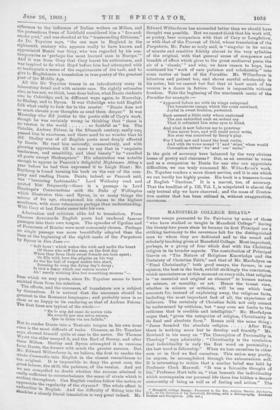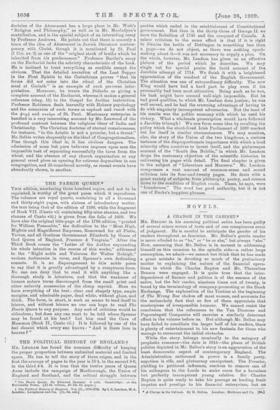MANSFIELD COLLEGE ESSAYS.*
THESE essays presented to Dr. Fairbairn by some of those " who have studied or taught in Mansfield College" during the twenty-two years since he became its first Principal are a striking testimony to the reverence felt for the distinguished man to whom they are dedicated and to the sound and scholarly teaching given at Mansfield College. Most important, perhaps, is a group of four which deal with the Christian religion in its broader aspects. The contribution of Principal Garvie on "The Nature of Religious Knowledge and the Certainty of Christian Faith," and that of Mr. Macfadyen on "Final Christianity," both good essays, the former, in our opinion, the best in the book, exhibit strikingly the conviction, which encounters us at this moment on every side, that religion is " as essential and original an element" in human nature as science, or morality, or art. Hence the truest view, whether in science or criticism, will be one which best accounts for, instead of explaining away, the religious facts, including the most important fact of all, the experience of believers. The certainty of Christian faith not only cannot be undermined by criticism, but " may even set limits to the criticism that is credible and intelligible." Mr. Macfadyen urges that, "given the categories of religion, Christianity is its final and absolute form." Renan said the same et.hilinigni,:
"Jesus founded the absolute religion A there is nothing more but to develop and fructify." Mr. Rowland in his essay on "The Conception of Personality in Theology " says admirably : " Christianity is the revelation that individuality is only the first word on personality ; the last word is fellowship." When we lose ourselves in other men or in God we find ourselves. This union may partly, he argues, be accomplished through the subconscious self.
It is interesting to notice that a similar belief was held by Professor Clerk Maxwell. "It was a favourite thought of his," Professor Hort tells us, " that beneath the individuality which accompanies our personal life there lies hidden a deeper community of being as well as of feeling and action." The
• Mansfield College Essays : Presented to the Rev. Andrew Martin Fairbairn, AD„ on the Occasion of his Seventieth Birthday, with a Bibliography. Loudon' Hodder and Stoughton. [12a. net.]
doctrine of the Atonement has a large place in Mr. Watt's "Religion and Philosophy," as well as in Mr. Macfadyen's contribution, and is the special subject of an interesting essay by Professor Andrews. He points out that there is scarcely a trace of the idea of Atonement in Jewish literature contem- porary with Christ, though it is mentioned by St. Paul (1 Cor. xv. 3) as one of the "original stock of truths which he inherited from his predecessors." Professor Bartlet's essay on the Eucharist lacks the sobriety characteristic of the book. He is inclined to treat everything as credible except the obvious. That the detailed narration of the Last Supper in the First Epistle to the Corinthians proves " that its forms did not enter into the ritual of the Christian meal at Corinth" is an example of such perverse inter- pretation. Moreover, ho treats the Didache as giving a complete account of the Eucharist, whereas it makes a general reference (chap. 15) to the Gospel for further instruction. Professor Robinson deals learnedly with Hebrew psychology and the connexion of such terms as nephesh and ruach with the ikexi and 7rvei)ea of St. Paul. Missionary enterprise is handled in a very interesting account by Mr. Lenwood of the profound contrast between the religious ideas of India and Christianity. The Christian doctrine of eternal consciousness, for instance, "to the Asiatic is not a promise, but a threat." Mr. Selbie writes eloquently on the ideal of Congregationalism. Fine though this ideal is, it has obvious dangers. The admission of none but pure believers imposes upon men the impossible task of separating successfully the taros from the wheat, and the absence of any church organisation or any general creed gives an opening for extreme dogmatism in one congregation, and ill-considered novelty, as recent events have abundantly shown, in another.



























































 Previous page
Previous page